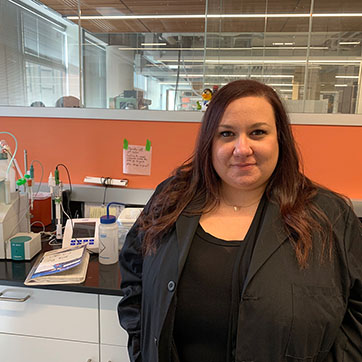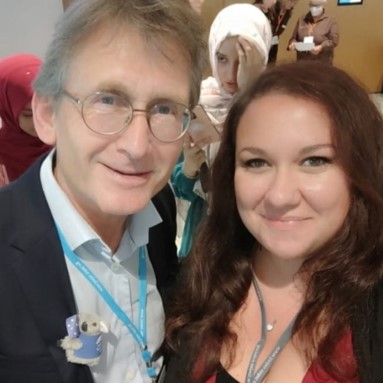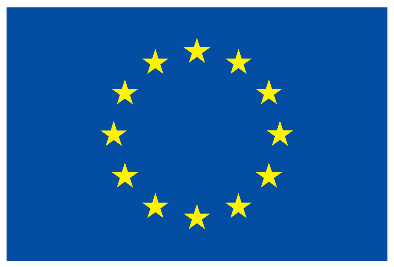Laura Fusco
Marie Curie Fellow
University of Padua, Italy
In addition to being a Marie Curie Fellow, Laura was also recently selected to participate in the 71st Lindau Nobel Laureate Meeting from June 26 to July 1, 2022 in Lindau, Germany.
 Laura Fusco in the Nanomaterials Group lab
Laura Fusco in the Nanomaterials Group lab
Please describe your research.
I am a Marie Curie Global Postdoctoral Fellow at the University of Padua, in Italy, working under the supervision of Dr. Lucia Gemma Delogu on the project “Mapping the skin-immune interactions of novel 2D materials: MXenes.”
My project will provide a thorough evaluation of the skin impact and possible immune modulation of a wide variety of MXenes, address key aspects of MXenes’ safety and their effective use in bioelectronics, epidermal electronics and medicine. Within the project, I will also have a second placement at the Karolinska Institutet in Sweden, under the supervision of Prof. Bengt Fadeel, one of the most influential scientists in the field of nano-immunology and toxicology. My project introduces the novel concept of “Nano-Skin Immunity-by-design”, where the analysis of the cutaneous effects when designing MXenes and other 2D materials will not only be relevant for their safety, but will also turn them into active tools for cutaneous applications. This may be achieved through their effect on immune system and by tailoring their physicochemical properties. By exploring these crucial aspects of biomedical applications of MXenes, we aim to create scientific foundations for use of these 2D materials discovered at Drexel in biomedicine and nanotechnology. Research that we are performing is of importance for development of implantable and epidermal electrodes, as well as cancer treatment by photothermal therapy.
What brought you to Drexel to work on your research?
Marie Curie Individual Global Fellowships allow researchers to undertake their own research project at a host organization in another country, thus gaining new skills through advanced training and intersectoral mobility. Thanks to this possibility, in October 2021, I started the international phase of my research project at the A. J. Drexel Nanomaterials Institute (DNI) and the Department of Materials Science and Engineering at Drexel University, where I am learning to produce and characterize novel two-dimensional (2D) nanomaterials - transition metal carbides and nitrides (MXenes). It is a great experience to learn from one of the inventors of MXenes and the most recognized leader in the field, Professor Yury Gogotsi, who supervises the international phase of my project.
Tell us about something in your research work that you are particularly proud of/excited about.
 Laura with Nobel Prize winner Ben Feringa at the Lindau Nobel Laureate Meeting
Laura with Nobel Prize winner Ben Feringa at the Lindau Nobel Laureate Meeting
I am very excited to explore the biomedical applications of MXenes, which have the potential to shape the future of nanotechnology and biomedicine thanks to their unique physical and chemical properties. MXenes have been attracting increasing academic and industrial interest in a very short space of time, as also demonstrated by the organization of specific conferences dedicated to this family of materials. I am extremely excited to participate in these events, including the International MXene Conference at Drexel University, and the MXene symposium hosted by the Material Research Society Meeting, where I was recently awarded the best poster and best pitch awards for our results on the biocompatibility of MXenes. I am also proud of the fact that I was recently involved in teaching the biomedical component of the online MXene Course, together with a dozen of researchers form Prof. Gogotsi’s group.
Thanks to the nomination received by the sponsoring organization of the project, I am also very excited to be among the Lindau Award recipients to attend the Lindau Nobel Laureate Meeting focused on Chemistry and interact with roughly 35 Nobel Laureates.

This project has received funding from the European Union’s Horizon 2020 research and innovation programme under the Marie Sklodowska-Curie grant agreement No 101029140.